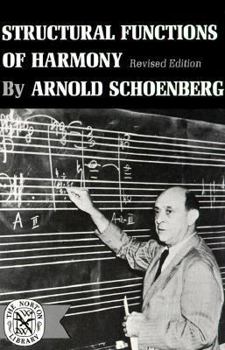Structural Functions of Harmony
Select Format
Select Condition 
Book Overview
The earlier chapters recapitulate in condensed form the principles laid down in his Theory of Harmony; the later chapters break entirely new ground, for they analyze the system of key relationships within the structure of whole movements and affirm the principle of monotonality, showing how all modulations within a movement are merely deviations from, and not negations of, its main tonality.
Schoenberg's argument is supported by music examples, which range from entire development sections of classical symphonies to analyses of the experimental harmonic progressions of Strauss, Debussy, Reger, and Schoenberg's own early music. The final chapter, Apollonian Evaluation of a Dionysian Epoch, discusses the music of our time, with particular reference to the possibility of new methods of harmonic analysis.
Structural Functions of Harmony is a standard work on its subject and provides an invaluable key to the development of musical structure during the last two hundred and fifty years. This new edition, with corrections, a new preface, and an index of subject headings, has been prepared under the editorial supervision of Leonard Stein.
Schoenberg's argument is supported by music examples, which range from entire development sections of classical symphonies to analyses of the experimental harmonic progressions of Strauss, Debussy, Reger, and Schoenberg's own early music. The final chapter, Apollonian Evaluation of a Dionysian Epoch, discusses the music of our time, with particular reference to the possibility of new methods of harmonic analysis.
Structural Functions of Harmony is a standard work on its subject and provides an invaluable key to the development of musical structure during the last two hundred and fifty years. This new edition, with corrections, a new preface, and an index of subject headings, has been prepared under the editorial supervision of Leonard Stein.
Format:Paperback
Language:English
ISBN:B00A2MUTUW
ISBN13:9780393004786
Release Date:January 2000
Publisher:W. W. Norton & Company
Length:222 Pages
Weight:0.49 lbs.
Dimensions:0.5" x 5.0" x 7.6"
Customer Reviews
5 ratings
Structural Functions of Harmony by Schoenberg
Published by Thriftbooks.com User , 15 years ago
Schoenberg's compositions are not at all among my favourites, but his interpretations of classical harmony -are- among the best available.
New Revelations of Old Forms
Published by Thriftbooks.com User , 17 years ago
Schoenberg writes from a traditional harmonic standpoint. But he is aware of the fact that the primary systems of analysis are very limited to these traditional sounds and harmonies. Therefore Schoenberg sets out to put into work a new system for harmonic analysis which will work fine on traditional harmonies as well as on newer, more outside progressions. He achieves all of this through his idea of regions within music, a specific idea with a broad goal. By leaving the intricacies of traditional harmonic analysis and widening his scope, Schoenberg presents a system we may all need to take a second look at.
not for beginners
Published by Thriftbooks.com User , 18 years ago
Well it looks like naj "jak" here is almost as clueless as he thinks the book is. He should know that Theory of Harmony is not a book to LEARN harmony, its a book that teaches you in detail the purposes and most advanced properties of such. If you're looking to begin music, do not buy this book. If you are a musician looking for a (in my opinion) genius's perspective on one of the most fundamental elements of music...then thats the book for you.
Master Class
Published by Thriftbooks.com User , 24 years ago
If you are a musician and want to know more about harmony, Schoenberg's thoughts should be at least considered. You might not necessarily agree with him, but keep in mind that Schoenberg always taught from a traditionalist standpoint. Despite his "revolutionary" logo, Schoenberg never cared much for music before Bach. Even Schoenberg's idol and so-called reactionary, Brahms, thought highly of Josquin DesPres. And while there are probably better teaching books around, considering Schoenberg's music will be played 200 years from now (at the very least, Verlarkte Nacht) and yours probably won't (unless it's used on TV ad or played on an oldies station), you might want to get some idea of what makes this guy so utterly fascinating.
Advanced harmony theory concerning mainly on Region concept.
Published by Thriftbooks.com User , 27 years ago
It deals with advanced harmony theory based on traditional theory. This book introduces Region concept of harmony. It is eccential concept for understanding the structure of harmony progression related with modulation. But I was able to find it only from this text, any other books of harmony do not deal with such concept.





